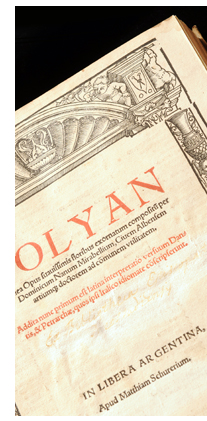Elizabethan influences
By Elizabeth Station
Photography by Dan Dry

Princeps sine literis—a ruler without learning—“is like a ship without a steering oar and a bird without wings.” In 1563 Queen Elizabeth I gathered such maxims into the Sententiae, a collection of Latin quotes on how a monarch should rule.
During the Renaissance, educated people often kept commonplace books of “sayings that they thought could guide them in their lives, derived from their reading,” says English professor Joshua Scodel. Elizabeth published the Sententiae early in her reign partly to demonstrate her erudition and mastery of languages other than English. The quotes she chose—on rule, justice, mercy, counsel, peace, and war—also assert her values to Europe’s social elite.
Elizabeth was a lifelong translator of Christian and classical texts. “As a young princess, she did translations to impress her tutors, her father, and her stepmother Katherine Parr,” says Scodel. “Later on in life she used it as kind of a calming recreation.” In researching Elizabeth I: Translations, 1544–1589 (University of Chicago Press, 2009), Scodel and coeditor Janel Mueller, an Elizabethan scholar and professor emerita in English, consulted books in Chicago’s Special Collections Research Center and other libraries to get a sense of the monarch’s sources and influences.
Elizabeth mined two popular anthologies—the Polyanthea (above) and the Flores omnium pene doctorum—for material. Although she had read and studied Seneca, Cicero, and Augustine in the originals, consulting these go-to compendia was the Renaissance equivalent of “googling for quotes,” says Scodel. “It’s what everybody did to seem like they were reading more.”
Close comparisons of the Sententiae with original sources reveal that Elizabeth made mistakes and changed words to suit her agenda. Yet the queen’s precision matters less than her perspective on recurring, urgent themes, says Scodel, such as how a ruler could show mercy and maintain authority: “What’s most interesting about the Sententiae are Elizabeth’s choices of what to quote and her deliberate modifications of her selections.”
Return to top
